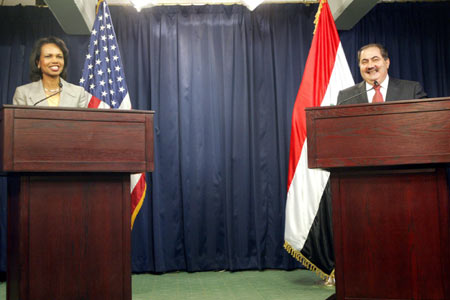Iraq and the US negotiators have reached a draft agreement on a proposed withdrawal timetable and other issues on the US military presence in Iraq beyond 2008, CNN reported Friday.
 |
|
US Secretary of State Condoleezza Rice (L) hold a joint news conference with Iraqi Foreign Minister Hoshiyar Zebari (R) in the heavy fortified Green Zone in Baghdad August 21, 2008. (Xinhua/Reuters Photo)
|
Iraqi Deputy Foreign Minister Mohammed al-Haj Hamoud, who is also Iraq's chief negotiator, told the channel that the US troops would completely pull out by the end of 2011.
He also said the US troops would stay clear of Iraqi cities by June 2009.
The US side has been rejecting a specific timetable for pulling out troops, arguing that must depend on the situation on the ground in Iraq.
Iraqi officials have asked for a timeline. And there are voices in the US to shift more troops to Afghanistan where fighting with insurgents is getting grim.
Another thorny issue is whether the US force would be subject to the Iraqi law.
Hamoud said the draft document proposes that the US authority has jurisdiction over its troops while they are in the camps and during operations.
Meanwhile, the US troops facing charges of committing crimes against Iraqi civilians could be put under the Iraqi jurisdiction, he said.
The deal must still be approved by both sides, Hamoud said.
After meeting with visiting US Secretary of State Condoleezza Rice on Thursday, Iraqi Foreign Minister Hoshyar Zebari told a press conference that the deal was almost finalized and would be presented to Iraq's leaders for review.
If approved, the agreement still have to clear the parliament, where a bumpy road is expected.
An Iraqi foreign ministry official, who declined to be named, said Friday that a council consisting of Iraqi leaders and heads of major parties would discuss the draft on the day.
Given the timetable, the US still has a leeway to manage to keep its military presence longer.
The tentative agreement says that the US troops could overstay if the Iraqi government deems that as necessary. A joint committee would help define the duration and number of forces that would be needed and regularly assess the security situation in Iraq, CNN said.
The US military can only detain Iraqis with the approval from the Iraqi side and the detainees should be handed over to Iraqi authorities within 24 hours after their arrests.
Iraq also wants to deprive foreign contractors of immunity. Demand is high in Iraq to remove that privilege from the contractors, who have been accused of excessively using force, notably the killing of 17 Iraqis on a Baghdad street by the guards of US security company Blackwater last September.
The negotiations formally began on March. The two sides had planned to sign the agreement, along with a pact regarding broader bilateral relations, by the end of July to give the US troops a legal ground in staying here after the UN mandate on Iraqi operations ends at year's end.
The talks ended up overshooting the schedule as Iraqi leaders were showing a hard stance in key points in the face of large pressure at home not to agree to any pact harming sovereignty and interests.
US President George W. Bush wants to see the agreements signed within his tenure ending in January.
With only about four months to go before the UN mandate expires, Rice traveled to Iraqi Thursday to give the process a push.
Rice told reporters that Iraq and the US have agreed "that some goals, some aspirational timetables for how that might unfold are well worth having in such an agreement."
"The negotiators have made good progress. They are satisfied with where they are," she said without giving details of the agreement.
A prolonged stay of the American force in Iraq is also an issue of heated debate in the US presidential campaign
Republican presidential candidate John McCain endorses Bush's policy which opposes a quick withdrawal, arguing that such a move would cost the US a security gain in Iraq.
While his Democratic rival Barack Obama says he will pull out troops within 16 months if he is elected, a policy similar to that proposed by Iraq.
The agreement in question also raised concern of Iran, which fears that the US could use Iraq as a launching pad for attacks.
On Thursday, Zebari repeated Iraq's stand that his country will not be used for military operations against neighbors.